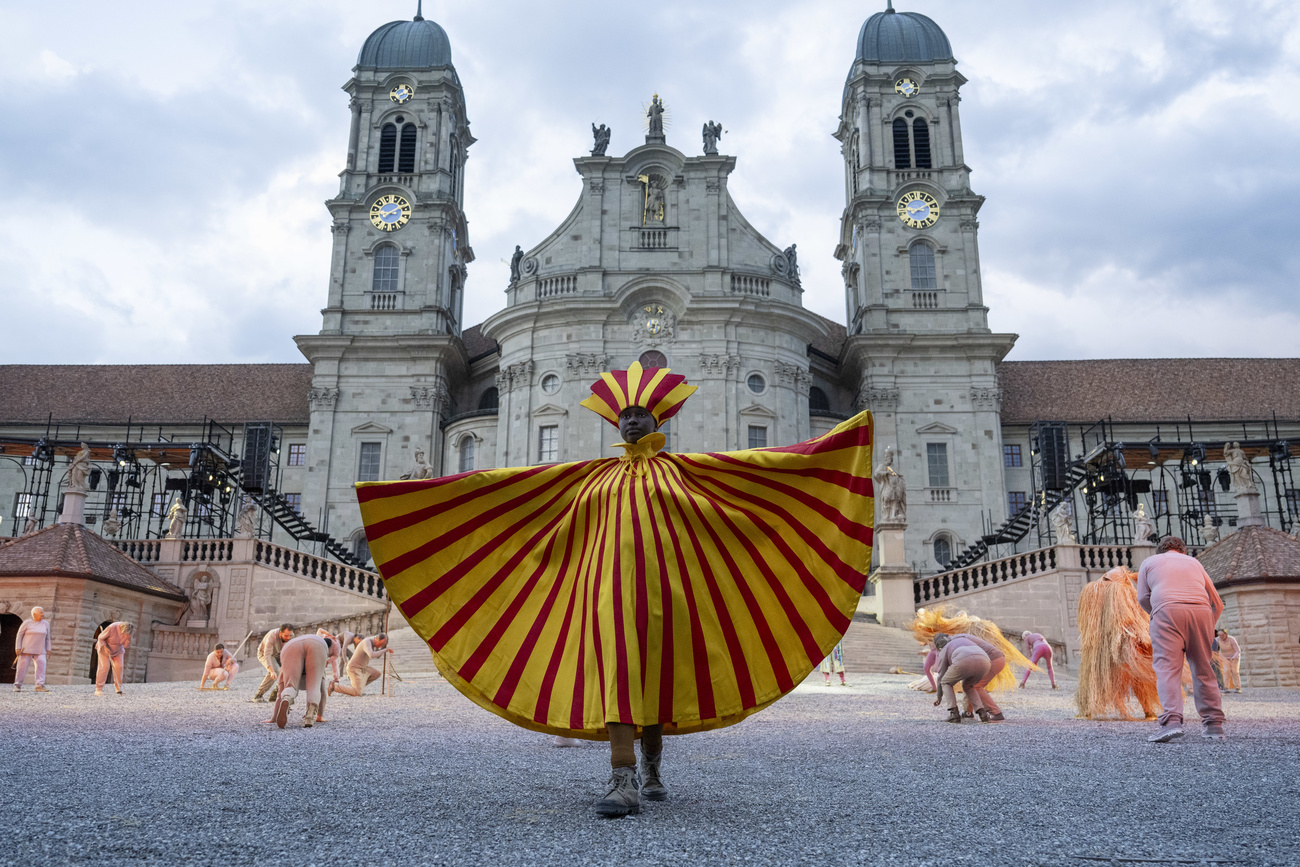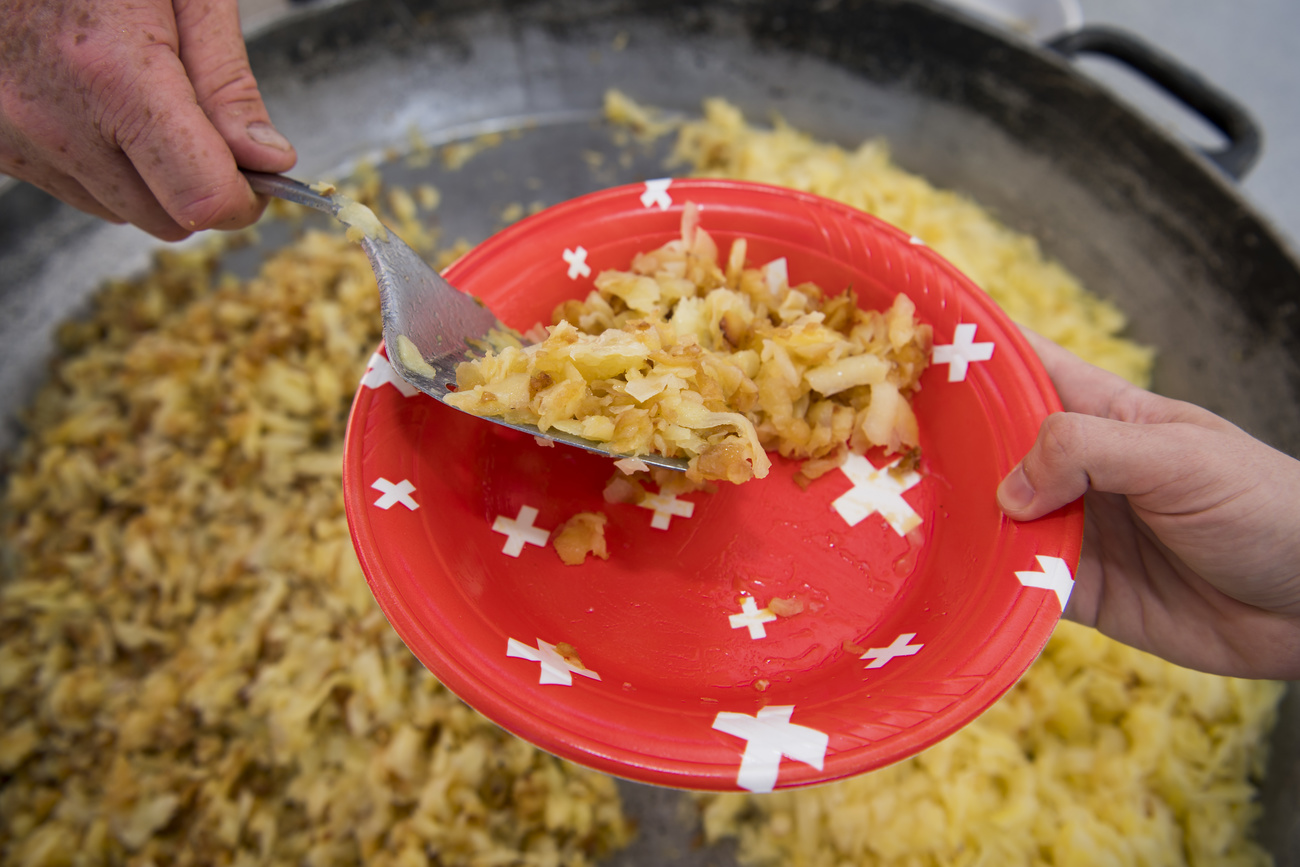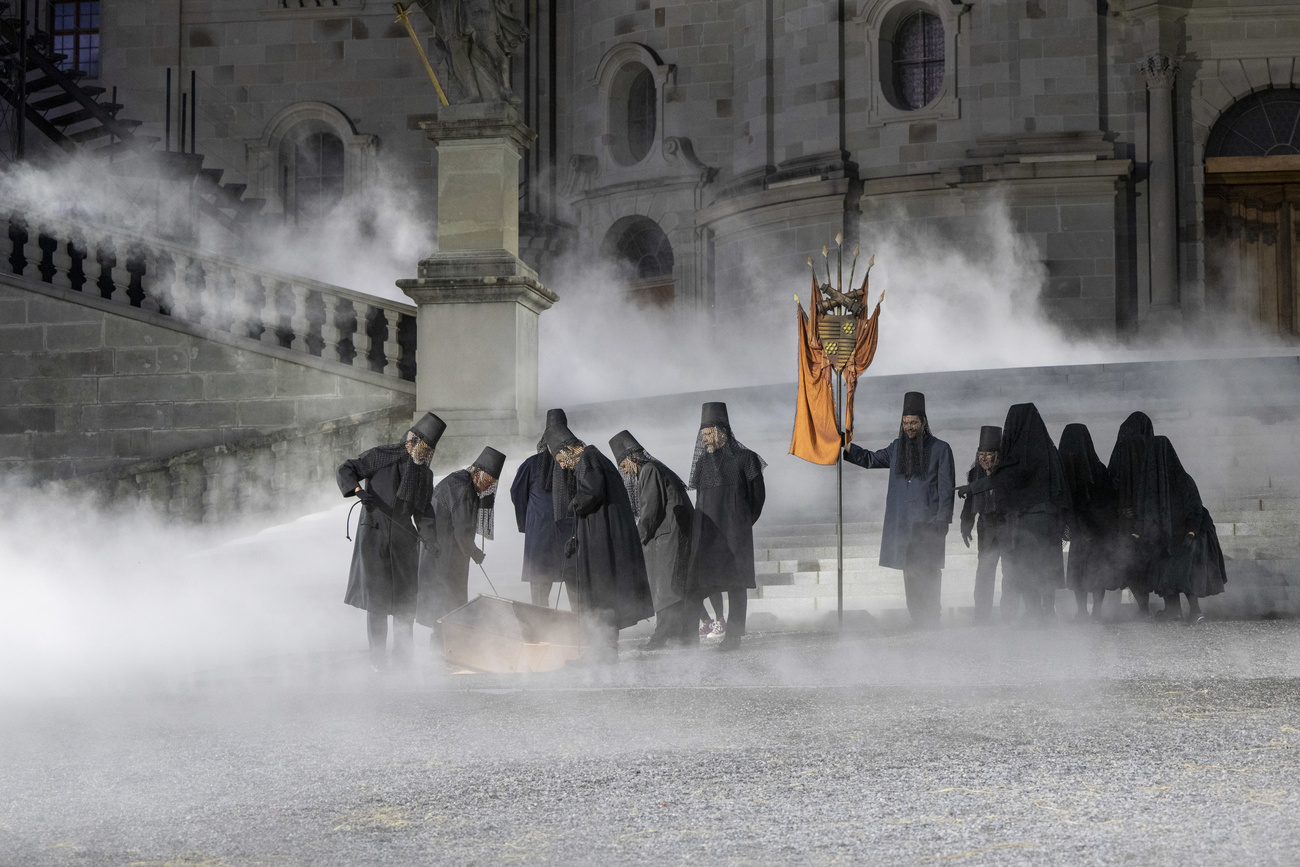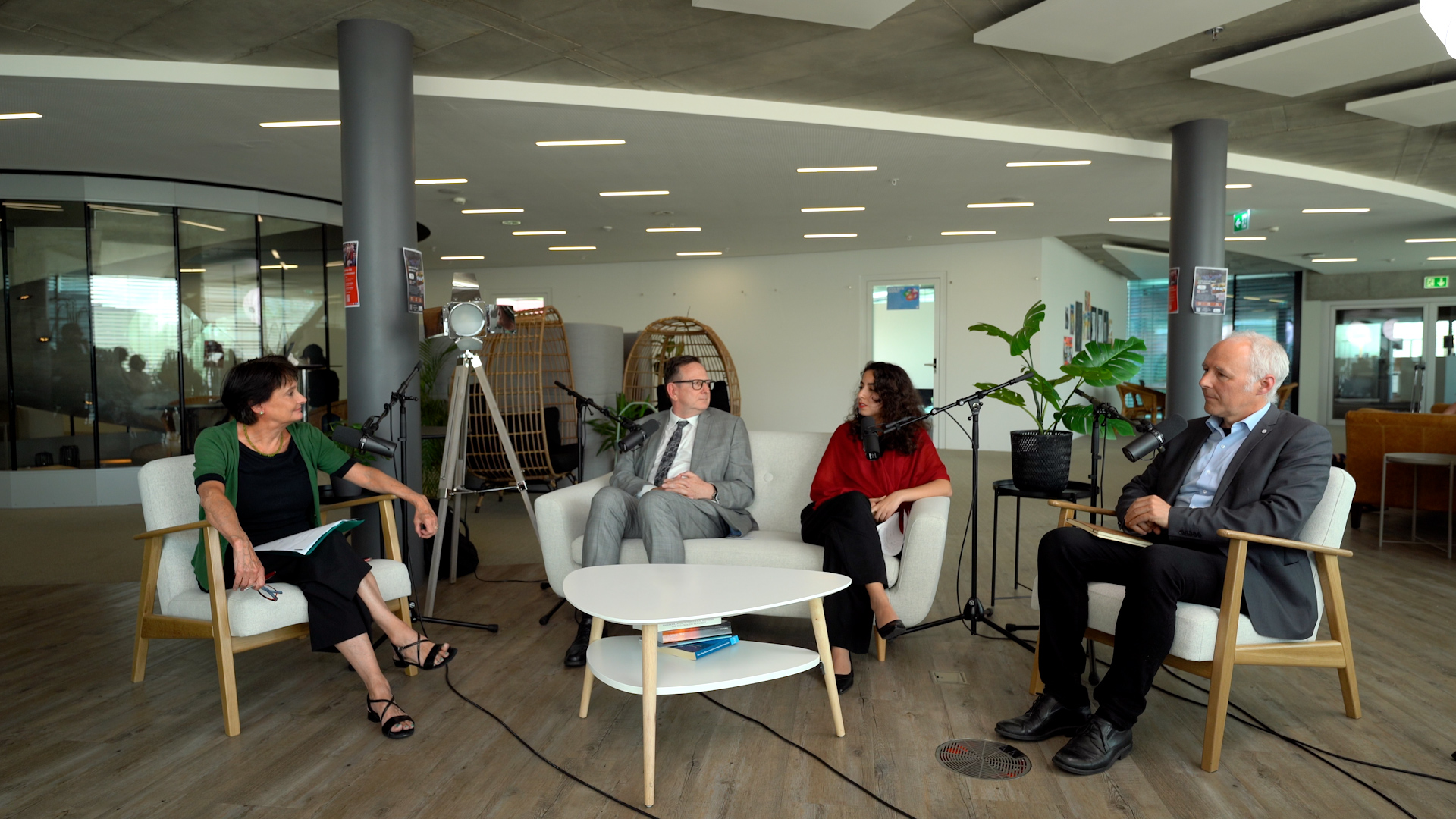

Switzerland Today
Dear Swiss Abroad,
All the world’s a stage, and tonight in Einsiedeln – as for the past 100 years – the stage becomes the world.

In the news: Pumping post-pandemic iron, ‘out of order’ Russian comments about the Swiss president, renting vs buying, repatriating Eritrean asylum-seekers, and merging UBS and Credit Suisse.
Gym subscriptions in Switzerland have climbed beyond pre-pandemic levels. On average, people worked out 1.3 times a week last year. In total, over 1.3 million people – around 15% of the population – trained in one of the 1,348 gyms across the country.
Swiss President Viola Amherd said that statements made against her on Russian television recently were so out of order that they were “clearly a case of disinformation”. Ahead of a Ukraine peace conference organised by Switzerland this weekend, Amherd was said to be addicted to luxury, not particularly attractive and was called a “baby killer” and a “Satanist”. She said the attacks were so absurd that they had lost their seriousness.
Falling mortgage rates and rising rents in Switzerland could lead to a situation favouring buyers by early 2025, a UBS study predicts. The main drivers of this trend are the two key interest rate cuts still expected from the Swiss National Bank.
The Swiss parliament has approved an idea to conclude a so-called transit agreement with a third country – as yet undefined – for the return of rejected Eritrean asylum-seekers. At present, rejected Eritrean asylum-seekers cannot be forced to return to their country, since Eritrean authorities categorically refuse such repatriation of their nationals.
The head of UBS Switzerland said today that the operational merger could happen as early as next month – somewhat sooner than planned. The legal merger of UBS AG and Credit Suisse AG was finalised on May 31.

Measures to tackle rising healthcare costs won the backing of French- and Italian-speaking Switzerland on Sunday but failed nationally. It’s the latest example of a linguistic and cultural divide that has been around for centuries.
But new trends are emerging, according to my colleague Anand Chandrasekhar. In this article he found that a look at the map of Switzerland showing Sunday’s results indicated the return of a familiar bogeyman: the Röstigraben or “Rösti ditch”. This refers to differences between the German-speaking majority and the other language regions not only in terms of preference for a traditional fried potato dish – Rösti – but also on other matters of greater national importance.
According to the Political Atlas of Switzerland, which contains analyses of over 1,000 political votes and elections as far back as 1866, the linguistic divide was much more significant in the past: ideological differences between language regions were evident in two-thirds of election results in the 19th century. In the 20th century, only social and foreign policy issues generally continued to divide these regions, with 10%-30% of votes showing such patterns.
What’s the situation today? Are political differences linked to a fondness or aversion for potato dishes? Do viewpoints differ depending on whether you eat fondue or raclette? “Individuals in the German-speaking part of Switzerland are more prone to future-oriented behaviour than their French-speaking fellow citizens,” said a report published by the University of St Gallen in 2022.
This eye on the future means that German-speakers save more for retirement, are more likely to pursue continuing education and training, are less likely to gamble, and have higher overall wealth. It also affects policy preferences, especially when future rewards are vague but short-term costs are immediately clear. This includes topics such as social welfare programmes, market economy reforms or measures to deal with climate change.
“The findings stress the benefits of federalism,” the report concluded.

Pedro Calderón’s play The Great Theater of the World has been performed in Einsiedeln, central Switzerland, for 100 years. The work, which has its 2024 premiere tonight, involves the entire community.
The Great Theater of the World, written by Spanish playwright and clergyman Pedro Calderón and translated by Joseph von Eichendorff, was staged for the first time in front of the baroque Einsiedeln abbey in 1924. It’s a mystery play in which six allegorical figures – Beauty, Wisdom, the King, the Rich Man, the Peasant and the Beggar – are assigned their roles by the Author (God), as Swiss public television, SRF, explainsExternal link. They must fulfil these roles until their death. In the afterlife, the reckoning begins.
The monastery square in Einsiedeln had been built with good acoustics, but theatre had never been performed on it until 1924. What didn’t play along 100 years ago was the weather, and the premiere had to be postponed. Now, however, rain doesn’t matter – at least to the audience: for the first time the auditorium is covered.
More than 500 amateurs volunteer their time in front of and behind the stage. However, Hanspeter James Kälin, president of organising society, explains that a contribution is still a tradition: “It used to be extremely important. Even at home. We waited for it: when will the ‘Great Theater’ money arrive? It was also used to buy Christmas presents.” Grandparents, parents, children: the whole family was involved. Kälin’s father, a tailor, appeared in leading roles and made costumes at home. “There were bits of flannel flying around the whole house. It looked like it was snowing.”
It hasn’t always been fun for all the family, though. In 1970 The Great Theater of the World was denounced as outdated by protesters at the premiere. They demanded a fundamental rethink of the play, which they said was based on a divinely ordained hierarchical order and thus legitimised prevailing power relations.
In 2000 the organisers created a new version that no longer felt obliged to Calderón alone, but also to current issues. The revolutionary reinterpretation with author Thomas Hürlimann and director Volker Hesse, was a success. Hürlimann and Hesse collaborated in Einsiedeln again in 2007, but inflated condoms and monks throwing themselves off the monastery towers were too much for conservative circles.
This year author Lukas Bärfuss and director Livio Andreina have reinterpreted Calderón’s play, bringing the characters back to life. But they refuse to play a part in today’s world. Only the young Emanuela agrees to do so – with all the consequences that involves. She becomes old, poor, rich, powerful, beautiful, warm and heartless. She chases the Author, who directs the people, to the Devil. Ultimately, the question remains: “Have I acted wisely?”
All the world’s a stage, and in Einsiedeln – as in the past 100 years – the stage becomes the world.

This year marks also the 75th anniversary of the Geneva Conventions, which aimed to protect people affected by armed conflict. But how relevant are these – and international law in general – especially for younger generations?
With war raging across the world, host Imogen Foulkes held a special edition of our Inside Geneva podcast at the Geneva Graduate Institute to understand whether international law is still alive.
More

In compliance with the JTI standards
More: SWI swissinfo.ch certified by the Journalism Trust Initiative






























